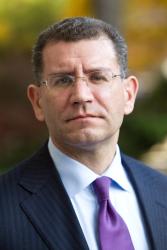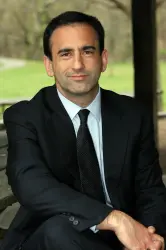

10:00 am EDT - 11:30 am EDT
Past Event
10:00 am - 11:30 am EDT
1775 Massachusetts Ave., NW
Washington, DC
The Saban Center for Middle East Policy at the Brookings Institution held a press briefing on the unresolved question of how to handle Iran’s nuclear ambitions in light of the developments in Lebanon on June 24, 2006. Martin Indyk, Director of the Saban Center for Middle East Policy moderated the event.
Kenneth Pollack, Director of Research at the Saban Center began the discussion by presenting the Iranian perspective. Pollack recapped the events that preceded the fighting in Lebanon, underscoring that the international community had come together with an unprecedented package of incentives and disincentives to halt the Iranian nuclear program. When forced to respond to the package presented by the international community, the Iranians faced a dilemma. They did not want to reject the package deal because doing so would incur economic sanctions and start them down the path toward greater punishment, but they also did not want to accept the package and so give up their nuclear program. Although the degree to which the Iranians were involved, if at all, in Hizballah’s kidnappings is unknown, the Iranian leadership is undoubtedly relieved that international attention has now been focused elsewhere.
Pollack argued that there is both opportunity and danger following the events in Lebanon. To the extent that the international community holds the Iranians culpable for Hizballah’s aggression, the Iranians will face increased resistance to their desire to advance their nuclear program. However, as the violence continues, the situation presents the Iranians with an opportunity to be seen as a force for stability in the region. If Iranians are ultimately the only player that can reign in Hizballah, they can leverage that power for leeway on their nuclear program.
Philip Gordon, Director of the Center on the United States and Europe at Brookings, then discussed the position of the European Union’s negotiators with Iran (Britain, France and Germany, the EU-3 which has represented the European Union). He presented the EU-3’s motivations for involvement with Iran, including concerns on proliferation issues and the desire to head off unilateral U.S. action against Iran. Over three years of negotiations, a familiar pattern of Iranian behavior has become clear, every time Iran started to walk away from the process and the Europeans threatened to go to the UN Security Council, Iran would come back and the talks would begin again. That ended when the Iranians resumed uranium enrichment activities, which they had earlier agreed to suspend as part of the talks with the EU-3. This essentially ended talks between the EU-3 and the Iranians. Ultimately, despite having diplomatic and economic relationships with Iran, the EU-3 did not have much in the way of incentives (“carrots”) to offer the Iranians. The United States can offer much more, and the Iranians have been waiting for U.S. involvement in the negotiations. Similarly, the United States is unable to offer disincentives (“sticks”), which leaves EU-3 willingness to impose sanction on Iran as part of a “carrots and sticks” package a necessary element of attempts to curb Iran’s nuclear program.
Gordon argued that the EU-3 will argue in favor of penalizing Iran, partly because the European Union’s credibility is at stake. Also, in light of the violence in Lebanon, for which Iran appears largely responsible, Iran is seen as a destabilizing force in the region. So, with the United States and the EU-3 ready for the UN Security Council to take action, much of the outcome will depend on Russian and Chinese readiness to approve measures against Iran.
Carols Pascual, Vice President of Brookings, Director of the Foreign Policy Studies Program and a former Ambassador to the Ukraine, spoke on the Russian dimension of this issue. He predicted that Russia would be “schizophrenic” in its response to Iran and the crisis in Lebanon, reflecting its varied interests. Russia is deeply concerned about nuclear proliferation, and another nuclear power in its neighborhood is undesirable. Also, despite Russian economic ties with Iran in the short-term, Russia’s long-term economic development is dependent on a good relationship with the West. However, Russia is committed to not appearing subservient to the United States and wants to be seen as a strong global power. These competing interests complicate the Russian response.
Pascual predicted that Russian President Vladimir Putin will try to keep as many options open as possible while resisting strong pressure on Iran, partly because of Russia’s own fear that it might in the future be a target for sanctions. Russia will attempt to blend its security and economic interests in its response. The Russian government will argue that it should be part of any solution for the reprocessing and storage of Iranian nuclear materials to prevent them being used to manufacture nuclear weapons.
Finally, Jeff Bader, the Director of Brookings’ China Initiative discussed China’s role in any policy towards Iran. He said that China’s basic approach to relations with countries is to take states as they find them, with respect to sovereignty of states, not to meddle in China’s internal affairs and not to express a preference about forms of regime since at some point that can be turned against China. The Chinese relationship with Iran over the last few years has been about one issue, energy. However, as an increasing amount of Chinese oil imports will come from the Persian Gulf, China will also see stability in the region as a key strategic concern. That has implications for how China views Iran’s behavior.
China’s strong economic ties with Iran and its fear of creating a sanctions precedent that could rebound against it will prevent China from enthusiastically supporting sanctions. Ultimately though, the Chinese are, like the Russians, more concerned about nuclear proliferation, and focused on their relationship with their largest trading partner, the United States.
In response to questions, the speakers discussed the reaction of the Bush administration to the fighting in Lebanon. As the conflict continues, there will be more danger that Iran will use the situation to its advantage. Pollack argued that the Bush administration should act quickly and should look at the Lebanon crisis in terms of the larger conflict with Iran, instead of from a perspective centered upon Israel. Gordon stressed that U.S. cooperation with the European Union will be crucial for success.




Robert Einhorn
April 12, 2024

Ryan Hass, Colin Kahl
April 5, 2024
2024
The Brookings Institution, Washington DC
2:00 pm - 3:00 pm EDT